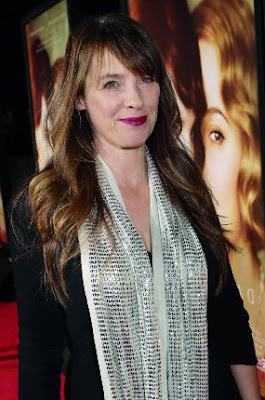Tackling the little-seen subject (among several here) of a "good" and highly religious couple who end up placing their religion and their idea of "god" above that of the welfare of their child,
FOR THEY KNOW NOT WHAT THEY DO -- anyone whose religious life included heavy study of the Bible's new testament will immediately know where those words come from (for those who don't, this is explained near the finale) -- offers up an extremely cogent and moving study of family relations when that family includes children who are on the GLBT spectrum.
As directed and co-written by
Daniel Karslake (shown at right) and co-written and edited by
Nancy Kennedy (below), the documentary covers four very different families -- different not only in their choice of religion but in how they respond to the needs of their children.
While they do the best they can, the results are very different, and the choice of these four families by the filmmakers proves to be both inspired and inspiring -- and in one case almost unbearably moving.
In two cases, the child in question is merely gay, in the other two he/she is transgendered. That
TrustMovies uses the word "merely" above makes further plain to him how far the GLBT movement has come during his lifetime, as well as making clear the still enormous difference (and continuing struggle) between being accepted as gay, lesbian or bisexual and being so as a transgendered human. The move does not beat this idea to death, but it does make certain that the viewer is aware and appreciative of it.
The film begins by introducing us to the Robertsons, Linda and Rob, first as young marrieds (above) who are deeply involved in their Evangelical Christian church, and later as a family with four fine children, one of whom, Ryan, lets them know during his early teen years, that he is gay.
We soon meet the Porchers (above) and the McBrides (below), both of whose offspring eventually becomes transgendered. The stories told here are as much about the effects and reactions of this "otherness" on the parents as on the kids themselves. Which is as it should be, since it is the parents who exert the most control over their children and can force the situation into something they may regret for life.

Since most viewers will not be familiar with the gay and trans children shown here, or for that matter with their parents (I was not, at least), the filmmakers wisely lay out the stories in a smart narrative form. What we learn about these families -- in one case, as with the Baez-Febos family, shown below, and the major event that their child becomes a part of -- consistently surprises us and often pulls us up short. We get a lot more than the merely "expected" here. The purpose of this documentary may be to change the viewpoint of as many people as possible, but the manner in which it does this is exemplary: it never raises its voice but still consistently draws us in.
The filmmakers clearly knew how to gain the trust of their subjects, and they in no way betray that trust. They also know how to film professionally; their movie is a pleasure to view. Consequently, we're immersed into all these lives (that's the Porchers' son Elliot, below),
but especially into the lives of that couple we first met, the Robertsons (shown below as their older selves). Their story, of a family so torn between fundamentalist religion and love for their son that they make decisions -- like
conversion therapy -- that will impact everything, forever.
We've already seen a number of films, both docs and narratives, dealing with the impact of this conversion therapy on the kids who went through it. It's a rare one, however, that gives us the parental viewpoint -- and does it so thoroughly and so well. While what the Robertsons have to answer for may be a terrible burden, what they are doing with this burden proves a wondrous thing.
This month will see a ton of GLBT offerings released for the yearly Gay Pride time. If any one of these is better -- more important, inclusive and hugely moving -- than
For They Know Not What They Do, I shall be surprised. (Among the advocates -- for the open and kindly type of religion offered by certain figures such as Jesus of Nazareth -- interviewed in the film are, above, Bishop Gene Robinson and, below, Reverend Dr. Jacqui Lewis.)
From
First Run Features and running a succinct 92 minutes, the documentary hits virtual theaters this Friday, June 12. Click
here and scroll down to visit the various theaters nationwide and to learn how you can view the film.

























































